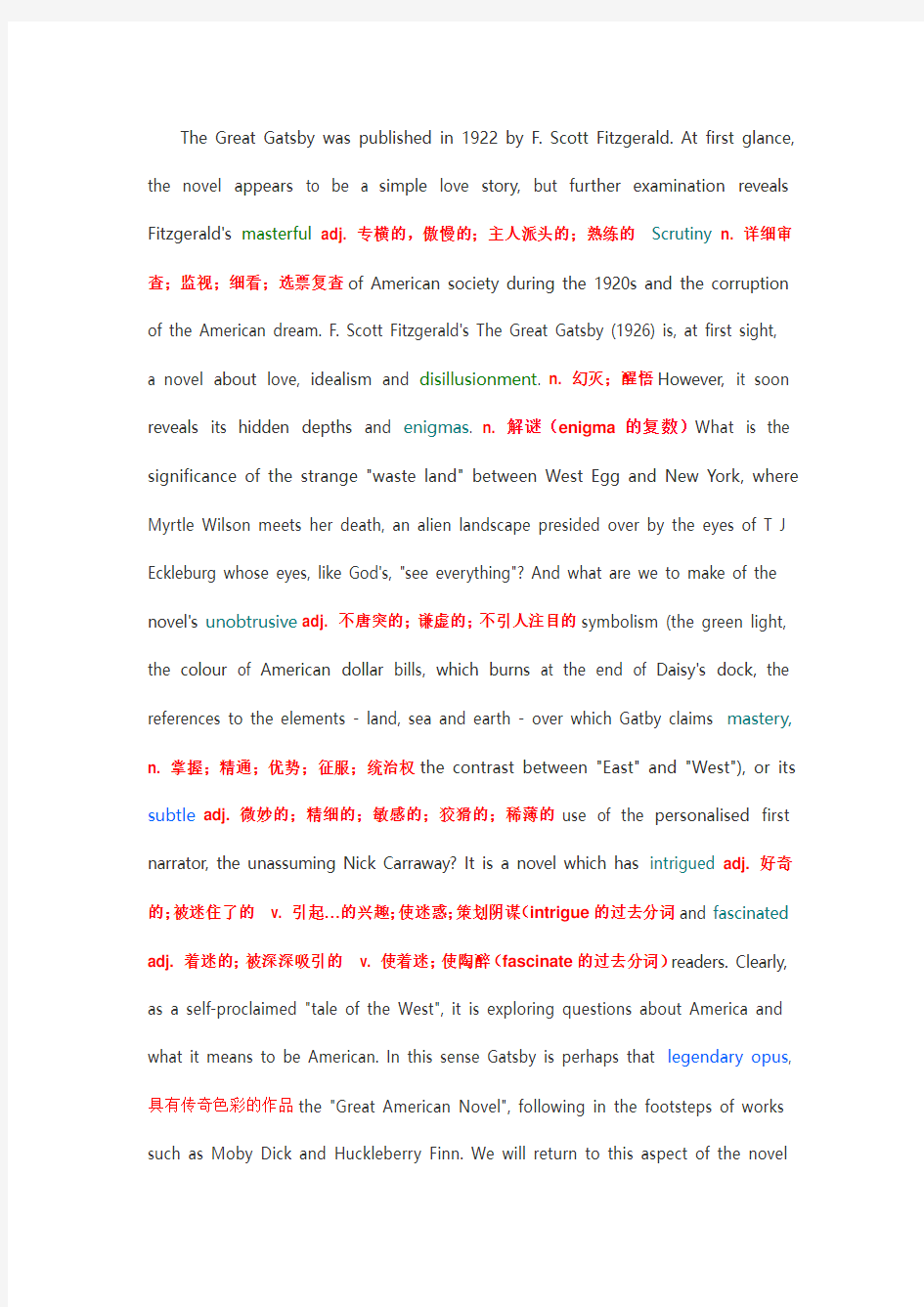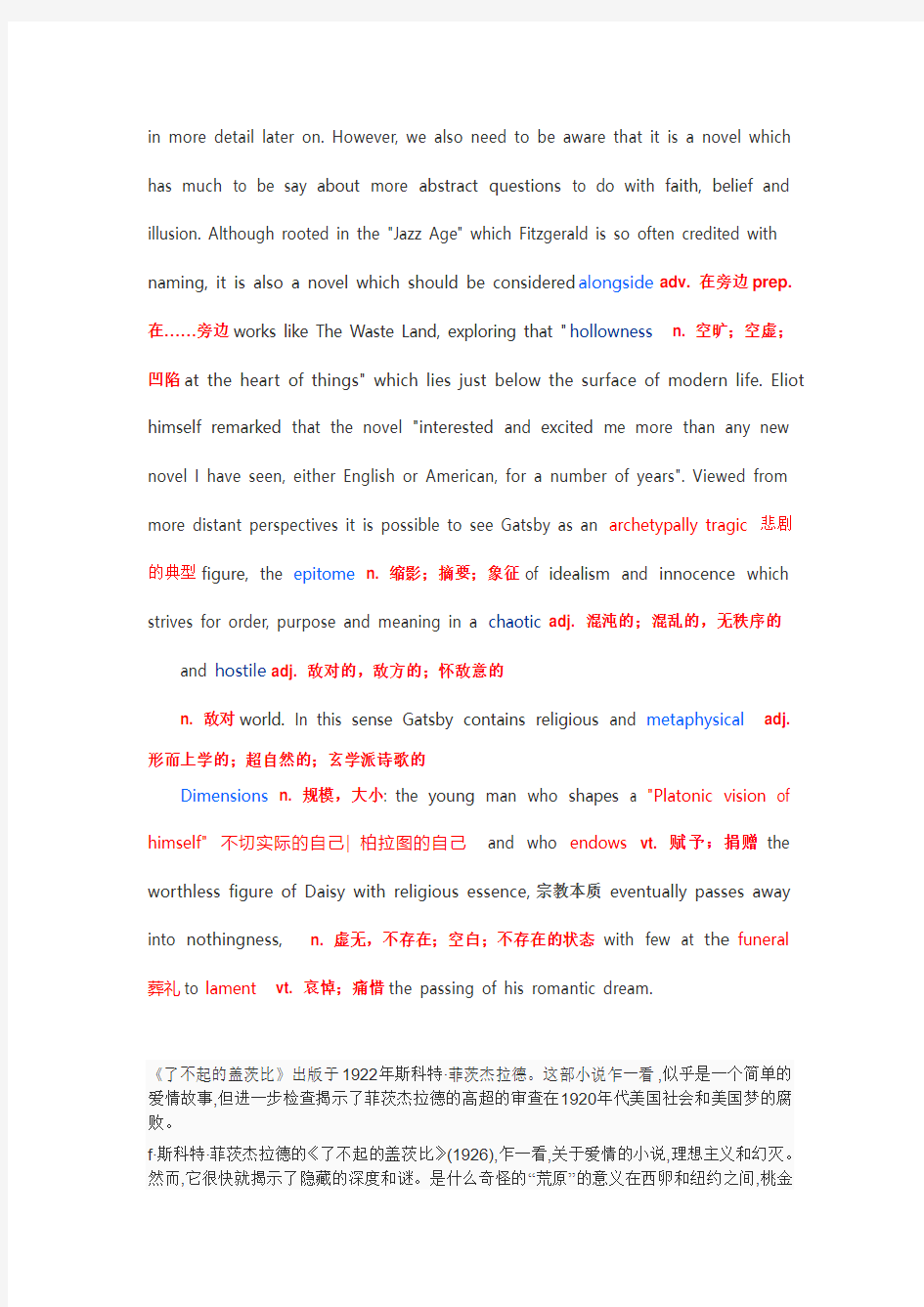The Great Gatsby 1


The Great Gatsby was published in 1922 by F. Scott Fitzgerald. At first glance, the novel appears to be a simple love story, but further examination reveals Fitzgerald's masterful adj. 专横的,傲慢的;主人派头的;熟练的Scrutiny n. 详细审查;监视;细看;选票复查of American society during the 1920s and the corruption of the American dream. F. Scott Fitzgerald's The Great Gatsby (1926) is, at first sight, a novel about love, idealism and disillusionment. n. 幻灭;醒悟However, it soon reveals its hidden depths and enigmas. n. 解谜(enigma的复数)What is the significance of the strange "waste land" between West Egg and New York, where Myrtle Wilson meets her death, an alien landscape presided over by the eyes of T J Eckleburg whose eyes, like God's, "see everything"? And what are we to make of the novel's unobtrusive adj. 不唐突的;谦虚的;不引人注目的symbolism (the green light, the colour of American dollar bills, which burns at the end of Daisy's dock, the references to the elements - land, sea and earth - over which Gatby claims mastery, n. 掌握;精通;优势;征服;统治权the contrast between "East" and "West"), or its subtle adj. 微妙的;精细的;敏感的;狡猾的;稀薄的use of the personalised first narrator, the unassuming Nick Carraway? It is a novel which has intrigued adj. 好奇的;被迷住了的v. 引起…的兴趣;使迷惑;策划阴谋(intrigue的过去分词and fascinated adj. 着迷的;被深深吸引的v. 使着迷;使陶醉(fascinate的过去分词)readers. Clearly, as a self-proclaimed "tale of the West", it is exploring questions about America and what it means to be American. In this sense Gatsby is perhaps that legendary opus, 具有传奇色彩的作品the "Great American Novel", following in the footsteps of works such as Moby Dick and Huckleberry Finn. We will return to this aspect of the novel
in more detail later on. However, we also need to be aware that it is a novel which has much to be say about more abstract questions to do with faith, belief and illusion. Although rooted in the "Jazz Age" which Fitzgerald is so often credited with naming, it is also a novel which should be considered alongside adv. 在旁边prep. 在……旁边works like The Waste Land, exploring that "hollowness n. 空旷;空虚;凹陷at the heart of things" which lies just below the surface of modern life. Eliot himself remarked that the novel "interested and excited me more than any new novel I have seen, either English or American, for a number of years". Viewed from more distant perspectives it is possible to see Gatsby as an archetypally tragic 悲剧的典型figure, the epitome n. 缩影;摘要;象征of idealism and innocence which strives for order, purpose and meaning in a chaotic adj. 混沌的;混乱的,无秩序的and hostile adj. 敌对的,敌方的;怀敌意的
n. 敌对world. In this sense Gatsby contains religious and metaphysical adj. 形而上学的;超自然的;玄学派诗歌的
Dimensions n. 规模,大小: the young man who shapes a "Platonic vision of himself" 不切实际的自己| 柏拉图的自己and who endows vt. 赋予;捐赠the worthless figure of Daisy with religious essence, 宗教本质eventually passes away into nothingness, n. 虚无,不存在;空白;不存在的状态with few at the funeral 葬礼to lament vt. 哀悼;痛惜the passing of his romantic dream.
《了不起的盖茨比》出版于1922年斯科特·菲茨杰拉德。这部小说乍一看,似乎是一个简单的爱情故事,但进一步检查揭示了菲茨杰拉德的高超的审查在1920年代美国社会和美国梦的腐败。
f·斯科特·菲茨杰拉德的《了不起的盖茨比》(1926),乍一看,关于爱情的小说,理想主义和幻灭。然而,它很快就揭示了隐藏的深度和谜。是什么奇怪的“荒原”的意义在西卵和纽约之间,桃金
娘威尔逊满足她的死,外星景观的眼睛T J Eckleburg主持的眼睛,像上帝一样,“看到一切”?和我们的小说的象征意义(绿灯,美国钞票的颜色,伯恩斯在黛西的码头,引用的元素——土地、海洋和地球——对Gatby声称掌握的“东方”和“西方”之间的反差),或其微妙的个性化第一叙述者,谦逊的尼克·卡拉韦?
这是一个新颖的好奇和着迷的读者。显然,作为一个自称“西方”的故事,它正在探索的问题对美国和美国意味着什么。从这个意义上说盖茨比可能是传奇作品,“伟大的美国小说”,继《白鲸记》和《哈克贝利·费恩历险记》等工作。
我们将更详细地回到这方面的小说。然而,我们还需要知道它是一个有很多的小说是说更抽象的问题与信仰,信仰和错觉。虽然植根于菲茨杰拉德的“爵士时代”是经常而命名,它也是一个小说,应考虑与作品像旷野,探索“核心的空旷的事情”,是现代生活的表面下方。
艾略特自己评论说这部小说“感兴趣和兴奋我比任何的新小说我看过,英语或美国,数年”。从更遥远的角度可以看到盖茨比作为一个悲剧人物的典型,理想主义的缩影和纯真,争取订单,目的和意义在一个混乱的和充满敌意的世界。从这个意义上说盖茨比包含宗教和形而上学的维度:形状的年轻人一个“自己的柏拉图式的愿景”,谁赋予黛西与宗教本质的价值图,最终去世成虚无,在葬礼上哀叹过去他的浪漫梦想。
The story is presented as a recollection of Nick Carraway, a young man from a patrician Midwestern family. Nick graduated from Yale in 1915; after fighting in World War I and an unsatisfactory postwar return to the Midwest, he moved to New York City to "learn the bond business" in "the spring of twenty-two." Nick declares that, following his father's advice, he avoids judging people: a habit that has caused trouble, exemplified by events concerning a man named Gatsby.
Nick explains that in 1922 he was renting an inexpensive bungalow sandwiched between two mansions in West Egg, a seaside community of wealthy parvenus on Long Island Sound. Directly across the bay was East Egg, inhabited by members of the "old aristocracy", including Tom and Daisy Buchanan. Daisy is Nick's second
cousin once removed; Nick knew of her husband Tom, a celebrated polo player at Yale. Nick describes the Buchanans through a visit to their opulent East Egg mansion: although phenomenally wealthy, Tom's glory days are behind him; he is a brutish, overbearing dilettante and Daisy, although engaging, cheerful, and attractive, is pampered and superficial with a largely ignored three-year-old daughter. Nick detects a strain in the relationship and Daisy's friend Jordan Baker, a well-known lady golfer, tells him that Tom has a mistress in New York City.
Tom offers Nick a lift to the city and on the way they stop at a shabby garage owned by George Wilson, where Nick is introduced to the owner's brassy wife, Myrtle Wilson. Her colorless husband George has no suspicion that she is Tom's mistress. Nick passively accompanies the couple to their urban love-nest, where Myrtle presides over a pretentious party that includes her sister Catherine. Catherine approves of the extramarital affair and informs Nick that both lovers cannot stand the people they married and would marry each other if Tom's wife was not a Catholic who "doesn't believe in divorce", something Nick knows to be untrue. Nick finds the evening increasingly unbearable but is unable to leave until Tom breaks Myrtle's nose in a spat. Nick, drunk, leaves with Chester McKee, a would-be artistic photographer. After a very strange night of drunkenness, Nick wakens to blearily go off to his job as a bond salesman.
Nick's next-door neighbor is the wealthy and mysterious Jay Gatsby, who every
other weekend throws lavish parties hosting hundreds of people. Nick receives a formal invitation from Gatsby's chauffer and attends. The party is wild and fun, but he finds that none of the guests know much about Gatsby and rumors about the man are contradictory. Many have never even met their host, as the parties are open and guests often attend uninvited. Nick runs into Jordan Baker, but they are separated while searching for Gatsby. A man strikes up a conversation with Nick, claiming to recognise him from the US Army's First Division during the Great War. Nick mentions his difficulty in finding their host and the man reveals himself to be Gatsby himself, surprising Nick, who had expected him to be older and not as personable. Gatsby invites Nick to more get-togethers, and an odd 'friendship' begins.
One day Gatsby appears in a magnificent yellow roadster and drives Nick to New York City, irritating him with the odd statement that Jordan will be asking Nick for a favor on Gatsby's behalf. Gatsby then presents a clichéd description of his life as a wealthy dilettante and war hero to an incredulous Nick, but the latter is convinced when Gatsby displays a Montenegrin war decoration. Gatsby then introduces a bemused Nick to underworld figure Meyer Wolfsheim. Nick then sees Tom and tries to introduce Gatsby, but Gatsby disappears.
Jordan reveals to Nick that Gatsby fell in love with Daisy before the war and hosts parties in the hope that she will visit. Gatsby has asked Jordan to ask Nick to get
him a meeting with Daisy. Nick agrees: the reunion is initially awkward, but Gatsby and Daisy begin a love affair. An affair also begins for Nick and Jordan, but Nick knows of Jordan's shortcomings and predicts that their relationship will be superficial.
Later, Daisy invites Gatsby and Nick over to her mansion and the three, accompanied by Tom and Jordan Baker, depart for a hotel in the city at Tom's suggestion. Tom also insists that he and Gatsby switch cars; he takes advantage of Gatsby's compliance by flaunting Gatsby's roadster to George Wilson. At the hotel, Tom eventually notices Gatsby's love for Daisy and, in front of Gatsby, Daisy, Nick, and Jordan, confronts Gatsby about his affair with Daisy. Gatsby urges Daisy to say that she never loved Tom; Daisy says that although she did love him, she still loved Gatsby as well. Tom mockingly tells Gatsby that nothing can happen between him and Daisy. Gatsby retorts that the only reason Daisy married Tom was because he (Gatsby) was too poor to afford to marry Daisy at the time. T om is angered and for the second time in the novel he visibly loses his composure. Tom then alleges that Gatsby is a bootlegger and expresses his loathing of him. Gatsby tries to defend himself to Daisy, but Nick and Tom observe that he fails and that Daisy is now beyond his reach. Confident that he has bested Gatsby, Tom tells Daisy to drive off with Gatsby in Gatsby's car, while Tom takes his time getting home in the company of Nick and Jordan.
The suspicions of George Wilson, husband of Tom's mistress Myrtle, have also been aroused and he too has been arguing with his wife. Myrtle runs outside only to be struck and killed by Gatsby's car, which is driven by Daisy. Daisy and Gatsby speed away. Later, Tom, Jordan, and Nick notice a commotion by the garage on their way to East Egg and stop. George Wilson, half-crazy with shock, rants about having seen a yellow car and Tom tells Wilson privately that the yellow car was not his (as he said earlier) but was Gatsby's, but Wilson does not seem to listen and Tom, Jordan, and Nick leave. The half-crazed Wilson, however, later makes a mental connection between the driver of the car and Myrtle's lover and resolves to pursue it.
The following day Nick learns the truth about the accident while breakfasting with Gatsby by his pool. Gatsby is depressed, unsure of whether Daisy still loves him and hoping for a call from her. Seeing himself as Gatsby's closest friend, Nick advises Gatsby to leave for a week. "They're [Daisy, Tom, Jordan] a rotten crowd," Nick says, "You're worth the whole damn bunch put together." Gatsby smiles the irresistible smile that Nick describes as having "faced-or seemed to face-the whole world, then concentrated on you with an irresistible prejudice in your favor".
Wilson appears at the Buchanan mansion with a gun, finding Tom packing to escape with Daisy. Tom, unaware of Daisy's culpability, names Gatsby as the driver of the car that killed Myrtle. Wilson finds Gatsby floating in his pool and kills him before committing suicide nearby.
Gatsby's funeral devolves upon Nick, whose attempt to find other mourners is virtually fruitless; not even Gatsby's shady business associates will attend. Apart from Gatsby's servants and Nick, the only other mourners are "Owl Eyes" (a Gatsby party guest) and Gatsby's father, Mr. Gatz. Left in the past by his son, he shows Nick a well-worn photograph Gatsby sent him of his mansion and a notebook from Gatsby's youth that he feels illustrates his son's drive and ambition.
Nick severs connections with Jordan (who claims to be engaged to another man), and, after a brief run-in with Tom, Nick returns permanently to the Midwest, reflecting on Gatsby's dreams and the sad and cyclical nature of the past.
这个故事是尼克·卡拉韦的回忆,一个年轻人从一个中西部的贵族家庭。尼克1915年毕业于耶鲁大学,在第一次世界大战和一个战斗后不满意战后回到中西部,他搬到纽约的债券业务”“学习”22岁的春天。”尼克宣称,他父亲的建议,他避免了判断人:造成麻烦,习惯以事件有关一个名叫盖茨比。
尼克解释说,1922年,他被租一个便宜的平房西卵夹在两个豪宅,一个富有新贵的海滨社区在长岛海峡。直接在海湾对面东蛋,居住着“老贵族”的成员,包括汤姆和黛西布坎南。黛西是尼克的第二个表弟一旦切除;尼克知道她的丈夫汤姆,一个著名的马球运动员在耶鲁大学。尼克描述了布坎南通过访问他们的华丽的东卵大厦:虽然非常富有,汤姆的光辉岁月是在他的背后;他是一个残忍的,傲慢的外行和黛西,虽然迷人,开朗,和吸引力,是纵容和表面很大程度上忽视了三岁的女儿。尼克检测的应变关系和黛西的朋友乔丹贝克,一个著名的女士打高尔夫球,告诉他,汤姆有一个情人在纽约市。
汤姆提供尼克搭车的路上,他们停在一个破旧的车库由乔治·威尔逊在尼克介绍给主人的厚脸皮的妻子桃金娘威尔逊。无色的丈夫乔治没有怀疑她是汤姆的情妇。尼克被动伴随这对夫妇他们的城市以“爱巢”,在桃金娘主持一个自命不凡的政党,包括她的妹妹凯瑟琳。凯瑟琳批准的婚外情和告诉尼克,恋人无法忍受他们结婚,结婚的人如果汤姆的妻子不是一个天主教徒“不相信离婚”,尼克知道的东西是不真实的。尼克发现晚上越来越无法忍受但不能离开直到汤姆打破了桃金娘的鼻子在争吵。尼克,喝醉了,树叶与切斯特麦基,潜在的艺术摄影师。非常奇怪的醉酒之夜后,尼克提醒朦胧地去他的债券推销员的工作。
尼克的隔壁邻居是富人和神秘的杰伊·盖茨比,他每隔一个周末把奢华的派对举办数百人。尼克收到从盖茨比的小炉和参加一个正式的邀请。晚会是野生和有趣,但他发现所有的客人了
解盖茨比和谣言的人是矛盾的。许多从未见过他们的主机,因为当事人是开放和客人经常参加不请自来的。尼克遇到乔丹贝克,但他们是分离而寻找的盖茨比。男人搭讪与尼克,声称承认他从美国陆军第一班在大战争。尼克提到他很难找到他们的主机和显示自己是盖茨比本人,令人惊讶的尼克,预计他将老,风度翩翩。盖茨比邀请尼克更多的聚会,一个奇怪的“友谊”就开始了。
一天盖茨比出现在一个华丽的黄色跑车和尼克去纽约,刺激他的声明,约旦将要求尼克为盖茨比的一个忙。盖茨比然后提出了一种老套的描述他的生活作为一个富有的业余爱好者和战争英雄怀疑尼克,但后者相信当盖茨比显示一个黑山战争装饰。盖茨比就引入了一个困惑的尼克·图迈耶Wolfsheim黑社会。尼克然后看到汤姆和试图介绍盖茨比,但盖茨比就消失了。约旦揭示了尼克,盖茨比爱上了黛西战前和主机方,希望她将访问。盖茨比要求乔丹问尼克让他与黛西。尼克表示赞同:团聚是最初的尴尬,但盖茨比和黛西开始一段恋情。外遇也开始对尼克和约旦,但尼克知道乔丹的缺点和预测,他们的关系将是肤浅的。
之后,黛西邀请盖茨比和尼克到她的豪宅和三个,在汤姆和乔丹贝克的陪同下,离开城市的酒店在汤姆的建议。汤姆还坚持说,他和盖茨比开关汽车;他利用盖茨比的合规炫耀盖茨比乔治·威尔逊的跑车。在酒店,汤姆最终通知盖茨比的对黛西的爱,盖茨比,黛西,尼克,和约旦,面临盖茨比与黛西。盖茨比敦促黛西说,她从来没有爱汤姆,黛丝说,尽管她爱他,她仍然爱盖茨比。汤姆取笑地告诉盖茨比,他和黛西之间没有什么可以发生。盖茨比反驳道,黛西嫁给了汤姆的唯一原因是因为他(盖茨比)太穷,负担不起嫁给黛西。汤姆是激怒了,第二次在小说中他明显失去了镇定。汤姆又称,盖茨比是一个走私者和表达自己对他的厌恶。黛西盖茨比试图为自己辩护,但尼克和汤姆观察,他失败了,黛西现在他够不着。相信他已经打败了盖茨比,汤姆告诉黛西开车和盖茨比在盖茨比的车,而汤姆则需要时间回家的尼克和约旦。
乔治·威尔逊的猜疑丈夫汤姆的情妇桃金娘,也被激起,他也一直在和他的妻子争吵。桃金娘跑外面只被盖茨比的车撞死了,这是由黛西。黛西和盖茨比速度。后,汤姆、约旦和尼克注意骚动的车库去东蛋和停止。乔治·威尔逊狂震,咆哮有看到一辆黄色轿车和汤姆私下告诉威尔逊,黄色的车不是他(他说)但是是盖茨比的,但威尔逊似乎并没有听和汤姆,约旦和尼克离开。半疯的威尔逊,然而,后来精神连接汽车的司机和桃金娘的情人和解析为追求它。
第二天尼克知道事故的真相而没有盖茨比池。盖茨比是沮丧,不确定是否黛西仍然爱他,希望从她的电话。看到自己是盖茨比最亲密的朋友,尼克为盖茨比离开了一个星期。“他们(菊花、汤姆、约旦)一个腐烂的人群,”尼克说,“你是值得整个堆的总和。“盖茨比的不可抗拒的微笑微笑尼克描述为“面或似乎加工工艺的整个世界,然后集中在你以你方为受益人的不可抗拒的偏见”。
威尔逊用枪出现在布坎南大厦,发现汤姆和黛西包装逃脱。汤姆,知道黛西的罪责,名字盖茨比那辆车的司机,杀死了桃金娘。威尔逊发现盖茨比漂浮在附近池并杀死他后自杀。
盖茨比的葬礼上下放尼克,试图找到其他的哀悼者几乎是徒劳的,甚至连盖茨比的阴暗商业伙伴将出席。除了盖茨比的仆人和尼克,唯一的其他哀悼者是“猫头鹰眼”(盖茨比派对客人)和盖茨比的父亲,积累性先生。离开过去由他的儿子,他显示了旧照片尼克盖茨比送他的豪宅和笔记本从盖茨比的青年,他感到了他儿子的动力和野心。
尼克·塞维连接与约旦(自称是与另一个人),,经过短暂的插入和汤姆,尼克永久回到中西部,反思盖茨比的梦想以及过去的悲伤和周期性。
